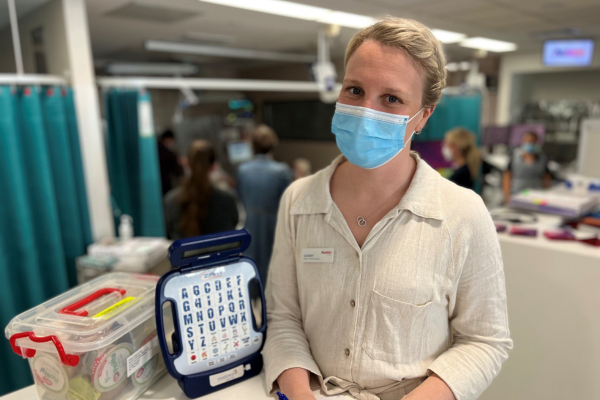About
Staff Spotlight: Gabby Chessells
- Home
- About
- Latest news
- Staff Spotlight: Gabby Chessells

21 August
Speech pathologists do more than help people to speak. They provide essential care to patients and help them to retrain people to eat and drink as well as re-learn how to express themselves and connect with loved ones.
In celebration of the work our speech pathologists do, we sat down with Gabby Chessells to hear more about her work. Gabby has worked at Austin Health since 2018 and has worked across a number areas and with a number of patients including head and neck cancer, spinal cord injury patients and most recently in our Intensive Care Unit (ICU).
This week is Speech Pathology week and the theme is communicating for life and looks to celebrate the unique skills of speech pathologists. What is one thing you do that people would not expect?
When patients have a tracheostomy tube (breathing tube in their neck) and require ventilation (a machine to help assist with breathing), we are able to introduce what we call a "leak" to the ventilator system which means that air can flow around the tracheostomy tube and out the patients mouth allowing them to talk. This provide patients a means to be able to verbally communicate. We do these sessions in conjunction with our physiotherapists.
What is the role of a speech pathologist for patients in the ICU?
In ICU we facilitate communication access, assess communication function and assess swallow function. Communication can be really hard in ICU when you are medically unwell and often have a breathing tube in. We aim to facilitate communication for these patients and we can do this by providing communication boards, using an electronic larynx (battery operated machine that produced sounds for you to create a voice), via the tracheostomy tube by a speaking valve or through communicating when on the ventilator. We also complete swallow assessment where we assess a patient swallow function to ensure food and drink don't go down the wrong way.
What do you love most about your job?
I enjoy the variety and complexity of our patients. Speech Pathology is so variable in its practice, we cover a range of clinical areas from tracheostomy to voice to swallow and language assessments. I love that each day I'm doing something different. Plus, it's always a nice reward to be the one to make a patient's day when they can start eating and drinking again!
How do speech pathologists increase the quality of life for their patients?
Speech pathologists enhance the quality of life for patients by addressing communication and swallowing challenges. Communication is extremely important in anyone’s life. Through personalised assessment and therapy, we help patients regain their ability to speak clearly, express themselves, and connect with loved ones. Additionally, food and drink is an integral part of our lives and we often hold many sentimental moments around food and drink. By improving swallowing function, we ensure patients can safely enjoy food and fluids. Our holistic approach not only restores essential functions but also boosts confidence, social engagement, and overall well-being, enabling patients to live their best life.
What would be one piece of advice you would give someone studying speech pathology and coming to the end of their studies?
To explore employment in the public health sector. Public health recognises the importance of seeking a professional setting that offers a robust supervision structure. This support network will empower you to continuously learn, adapt, and refine your skills, ensuring the best possible outcomes for your patients while fostering your personal and professional growth.


